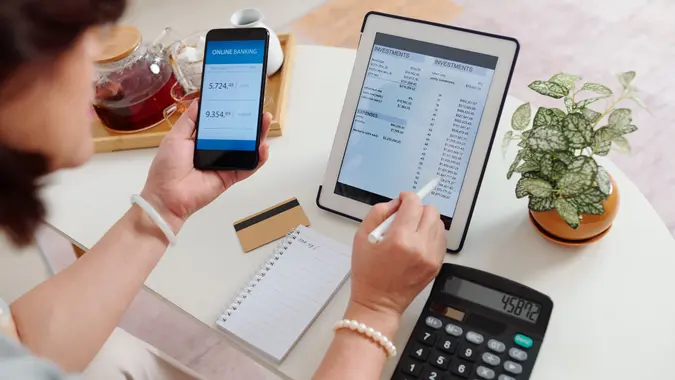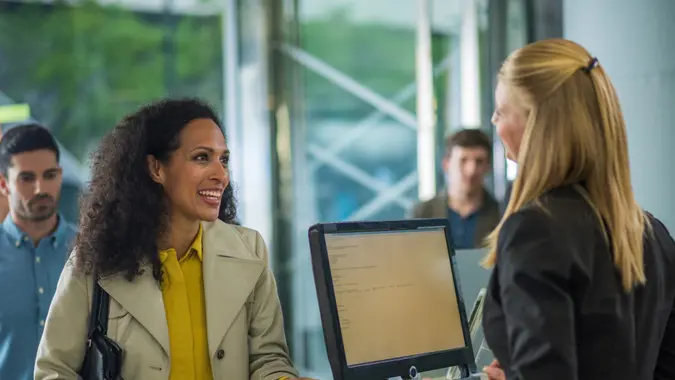Americans Think Stashing Their Money at Home Is Safer Than Most Bank Accounts, Survey Finds

Commitment to Our Readers
GOBankingRates' editorial team is committed to bringing you unbiased reviews and information. We use data-driven methodologies to evaluate financial products and services - our reviews and ratings are not influenced by advertisers. You can read more about our editorial guidelines and our products and services review methodology.

20 Years
Helping You Live Richer

Reviewed
by Experts

Trusted by
Millions of Readers
According to a recent survey by GOBankingRates, nearly 25% of Americans think their money is safer at home than most other places. And that’s understandable.
With recent bank failures making headlines and economic uncertainty, it’s no wonder Americans don’t trust the banking system. And while 35% of Americans still think that a savings account is the safest place to stash cash, a quarter of you don’t trust the banks.
Here are a few reasons Americans might distrust financial institutions, and a few reasons keeping your money at home is actually riskier than the bank.
Why 24% of Americans Stash Their Cash at Home
There are several reasons Americans prefer to keep their money at home instead of in a financial institution.
Biggest Bank Failures Since the Great Recession
With rapidly rising interest rates, a few large banks became financially unstable and eventually failed. Silicon Valley Bank, Signature Bank and First Republic Bank all held over $100 billion in total assets and failed in early 2023. The FDIC had to step in to reimburse depositors, even those that were not insured.
The news coverage was dire, leaving many average Americans wondering which bank would be next. This has broken the trust Americans have with the banking system, even though depositors were made whole in the end. Simply the thought of losing access to their might has spooked many.
John Grace of Investor’s Advantage Corp sees this type of economic uncertainty as having a big impact on where people choose to keep their money. “Historical financial crises have left lingering fears of bank failures or economic instability,” said Grace. Some people choose to keep cash at home as a precaution against potential disruptions in the banking system.
Some Banks Have High Fees
Banks are some of the most profitable companies in the U.S., and a portion of their income comes from banking fees. While fee income only makes up a small percentage of their overall profit, billions are paid out in banking fees each year. These fees include:
- ATM fees
- Monthly maintenance fees
- Non-sufficient funds (NSF) fees
- Foreign transaction fees
- Account closure fees
- Overdraft fees
- Excess transaction fees
- Wire transfer fees
- Replacement card fees
- Inactivity fees
- Overdraft protection fees
Larger national banks have higher fees than smaller regional banks, and private banks have higher fees than credit unions. These high fees can scare off consumers, who believe that banks are only out to earn money off their deposits — which is true.
Privacy Concerns
Some citizens simply don’t want the government or any bank keeping an eye on their transactions. With the rise in online scams and fear of surveillance, many don’t trust banks or any online financial institution.
Ben Gold from Recommended Home Buyers believes this might be a big reason nearly one quarter of Americans prefer to keep their cash at home. “Privacy breaches and data hacking incidents have led to concerns about the security of personal financial information held by banks,” said Gold. Keeping cash at home allows individuals to maintain direct control over their funds and personal data.
Banking Scams Are Getting Worse
Banking scams are losing Americans billions of dollars each year. According to new data collected by the FTC, Americans lost over $8 billion due to scams in 2022 alone. This is concerning for some, who might feel vulnerable keeping their money in a bank that can be accessed online.
Cash Is Tangible
In the digital age, your money is simply numbers on a screen. And while this is perfectly fine for many, some Americans want to be able to hold their money. Cash is tangible: You can store it in your wallet or keep it in a safe place at home. At the end of the day, cash is real to many citizens.
And you can quickly access funds without any restrictions. “A belief that physical cash provides immediate access to funds, unlike potential delays or restrictions that could be imposed by a bank, drives some to keep cash on hand for emergencies,” said Grace.
The Safest Places To Keep Your Money
While 24% of Americans prefer to keep their cash at home, this might actually be one of the riskier places to keep it. Cash can be stolen or lost at home, and there are no protections in place to reimburse you if you lose your money.
Instead, here are a few of the safest places to keep your money:
FDIC-Insured Bank Accounts — Checking or Savings
The Federal Deposit Insurance Corporation was formed after the Great Depression, and it protects deposits in any FDIC-insured bank in the U.S. Deposits are insured up to $250,000 per depositor, per account type.
This means if you have a checking account and a savings account, you are insured for up to $250,000 in each. And married couples in a joint account are insured up to $500,000 in deposits.
While banks collapsing may seem worrisome, the FDIC has reimbursed every insured depositor in a bank collapse since its inception 90 years ago. And on occasion, it has even stepped in and made whole depositors that exceeded the deposit insurance limits.
U.S. Treasuries
U.S. Treasuries are government-backed securities that include bills, bonds and notes that you can buy directly from the U.S. government. The U.S. Treasury market is often seen as one of the safest places in the world to park your cash, and you can earn interest, too.
While historically long-term Treasuries pay out higher rates, with today’s rising-rate environment, investors can buy short-term treasuries — under one year to maturity — and earn up to 5% interest or more. This makes it not only a safe investment, but a decent return, as well. Just note that selling your Treasury before maturity might erase any gains you may have had.
Certificates of Deposit (CDs)
Certificates of Deposit (CDs) are a type of savings account that pays you interest on deposits over a specific term. CDs are FDIC-insured, just like a regular bank account, and are among the safest ways to store your cash. But they aren’t as liquid as cash, as you might pay a penalty to access the funds early.
Methodology: GOBankingRates surveyed 1,141 Americans aged 18 and older from across the country between August 2 and August 6, 2023, asking twenty different questions: (1) Have you ever been the victim of identity theft, a financial scam or financial fraud?; (2) If you have been a victim of identity theft, which type of theft did you experience?; (3) If you have been a victim of a financial scam, which type of scam did you experience? (select all that apply); (4) If you have been a victim of financial fraud, what type of fraud did you experience? (select all that apply); (5) Have you ever been scammed making any of the following purchases?; (6) All together, how much money have you lost due to identity theft, financial scams and/or financial fraud?; (7) If you lost money due to identity theft, a financial scam or financial fraud, were you reimbursed for it?; (8) What is the most common way you are contacted by scammers?; (9) How often do you change your bank account passwords?; (10) How do you keep your money safe while traveling? (select all that apply); (11) Where do you think is the safest place to keep your money?; (12) How much physical cash do you keep at home?; (13) If you have been scammed out of money when shopping online, how much did you lose?; (14) If you are retired, have you ever experienced these common retirement scams? (select all that apply); (15) Have you, or any of your family members, experienced a Social Security scam?; (16) If you have lost money from a tax scam, how much did you lose?; (17) Have you ever experienced a student loan forgiveness scam?; (18) What type of impact do you think identity theft has on its victims?; (19) What are some ways you protect yourself from identity theft today? (select all that apply); and (20) Do you have antivirus software installed on your computer?. GOBankingRates used PureSpectrum’s survey platform to conduct the poll.
 Written by
Written by  Edited by
Edited by 

























